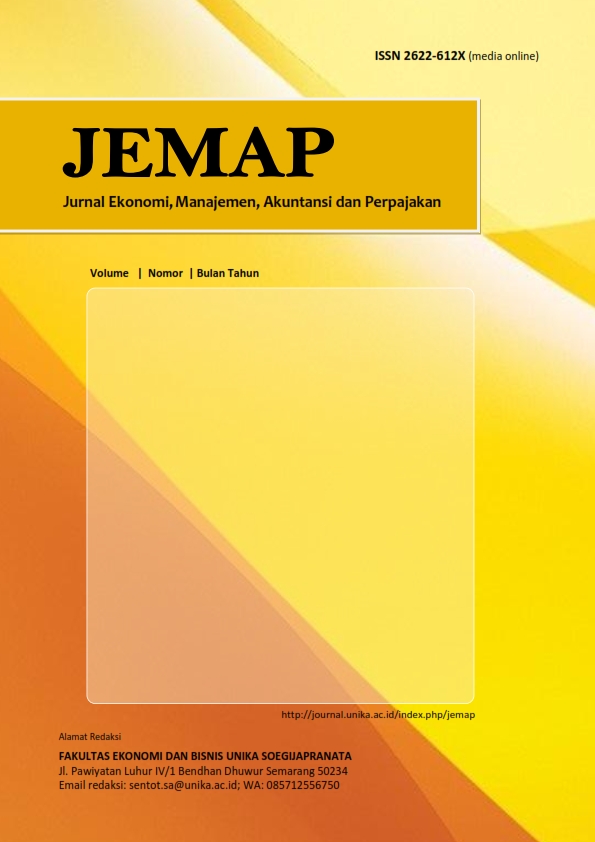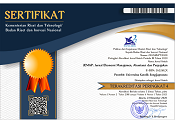Green Tax Indonesia Untuk Keberlanjutan Lingkungan Hidup: Studi Komparasi Global
Abstract
Keywords
Full Text:
PDF (Bahasa Indonesia)References
Ahdiat, A. (2024). Ini Industri Penyumbang Emisi Gas Rumah Kaca Terbesar di Indonesia. Databoks. https://databoks.katadata.co.id/lingkungan/statistik/b0d4d2a1d9aaa4c/ini-industri-penyumbang-emisi-gas-rumah-kaca-terbesar-di-indonesia
Ahza, N. Al. (2024). Traffic Tax, Solusi Kepadatan Transportasi. Direktorat Jenderal Pajak. https://pajak.go.id/id/artikel/traffic-tax-solusi-kepadatan-transportasi
Albrecht, J. (2006). The use of consumption taxes to re-launch green tax reforms. International Review of Law and Economics, 26(1), 88–103. https://doi.org/https://doi.org/10.1016/j.irle.2006.05.007
Anwar, M. (2022). GREEN ECONOMY SEBAGAI STRATEGI DALAM MENANGANI MASALAH EKONOMI DAN MULTILATERAL. Jurnal Pajak Dan Keuangan Negara, 4(1S), 343–356. https://doi.org/https://doi.org/10.31092/jpkn.v4i1S.1905
Appunn, K. (2021). What’s new in Germany’s Renewable Energy Act 2021. Journalism for the Energy Transition. https://www.cleanenergywire.org/factsheets/whats-new-germanys-renewable-energy-act-2021
Apriliyanti, K., & Rizki, D. (2023). KEBIJAKAN ENERGI TERBARUKAN: STUDI KASUS INDONESIA DAN NORWEGIA DALAM PENGELOLAAN SUMBER ENERGI BERKELANJUTAN. Jurnal Ilmu Pemerintahan Widya Praja, 49(2), 186–209. https://doi.org/10.33701/jipwp.v49i2.36843246
Aqilla, A. R., Razak, A., Barlian, E., Syah, N., & Diliarosta, S. (2023). Pengaruh Sampah Plastik Dalam Pencemaran Air. Gudang Jurnal Multidisiplin Ilmu, 1(6), 275–280. https://doi.org/https://doi.org/10.59435/gjmi.v1i6.203
Ayu, A. C. R. (2013). Formulasi Kebijakan Pajak Lingkungan (Environmental Taxation) Sebagai Instrumen Perlindungan Lingkungan Hidup Menurut Prinsip Regulerend. Fakultas Ilmu Sosial Dan Ilmu Politik UI.
Ayu, I., Diviariesty, K., & Ayu Rosa Dewinta, I. (2024). TREN RISET GREEN TAX PADA ARTIKEL ILMIAH TERINDEKS GOOGLE SCHOLAR : SYSTEMATIC LITERATURE REVIEW. Jurnal Ilmiah MEA (Manajemen, Ekonomi, Dan Akuntansi), 8(3), 1455–1470.
Badan Pusat Statistik. (2024). Neraca Arus Energi dan Neraca Emisi Gas Rumah Kaca Indonesia 2018-2022.
Barus, E. B., & WIjaya, S. (2021). Penerapan Pajak Karbon Di Swedia Dan Finlandia Serta Perbandingannya Dengan Indonesia. Jurnal Pajak Indonesia, 5(2), 256–279. https://doi.org/https://doi.org/10.31092/jpi.v5i2.1653
BBC Indonesia. (2014). Pajak Karbon Australia Dicabut Senat. BBC News Indonesia.
BEDER, S. (2011). Environmental economics and ecological economics: the contribution of interdisciplinarity to understanding, influence and effectiveness. Environmental Conservation, 38(2), 140–150. https://doi.org/DOI: 10.1017/S037689291100021X
Carl, J., & Fedor, D. (2016). Tracking global carbon revenues: A survey of carbon taxes versus cap-and-trade in the real world. Energy Policy, 96, 50–77. https://doi.org/https://doi.org/10.1016/j.enpol.2016.05.023
Christensen, H. B., Hail, L., & Leuz, C. (2021). Mandatory CSR and sustainability reporting: economic analysis and literature review. Review of Accounting Studies, 26(3), 1176–1248. https://doi.org/10.1007/s11142-021-09609-5
Fakhri, N. (2017). KONSEP DASAR DAN IMPLIKASI TEORI PERBANDINGAN SOSIAL. Jurnal Psikologi TALENTA, 3(1), 10. https://doi.org/10.26858/talenta.v3i1.13066
Festinger, L. (1954). A Theory of Social Comparison Processes. Human Relations, 7(2), 117–140. https://doi.org/10.1177/001872675400700202
Gede Dupopadana, I., Muhammad, ;, Arief, K., & Firmansyah, A. (2024). PERKEMBANGAN PELAPORAN BERKELANJUTAN DI INDONESIA. Journal of Law, Administration, and Social Science, 4(6).
Halim, A., Bawono, I. R., & Dara, A. (2014). PERPAJAKAN: Konsep, Aplikasi, Contoh, dan Studi Kasus (3rd ed.). Penerbit Salemba Empat.
He, P., Zhang, S., Wang, L., & Ning, J. (2023). Will environmental taxes help to mitigate climate change? A comparative study based on OECD countries. Economic Analysis and Policy, 78, 1440–1464. https://doi.org/https://doi.org/10.1016/j.eap.2023.04.032
Hernimawati, H., Mirad, A., & Sudaryanto, S. (2020). Policy of Environmental Tax in Indonesia: A Review. IOP Conference Series: Earth and Environmental Science, 469(1). https://doi.org/10.1088/1755-1315/469/1/012110
Khastar, M., Aslani, A., & Nejati, M. (2020). How does carbon tax affect social welfare and emission reduction in Finland? Energy Reports, 6, 736–744. https://doi.org/https://doi.org/10.1016/j.egyr.2020.03.001
Latifah, E. (2016). PRECAUTIONARY PRINCIPLE SEBAGAI LANDASAN DALAM MERUMUSKAN KEBIJAKAN PUBLIK. Yustisia Universitas Sebelas Maret, 5(2), 275–297. https://doi.org/https://doi.org/10.20961/yustisia.v5i2.8742
Mahardhika, V. A. (2024). Pajak Hijau Sebagai Strategi Hadapi Tantangan Perubahan Iklim . Direktorat Jenderal Pajak . https://www.pajak.go.id/index.php/en/node/105636
Margireta, I. A., Khoiriawati, N., Sayyid, U., & Tulungagung, A. R. (2022). Penerapan pelaporan sosial pada perusahaan sektor energi yang sudah terdaftar di Bursa Efek Indonesia. Jurnal Ilmiah Akuntansi Dan Keuangan, 4(12), 2622–2205. https://journal.ikopin.ac.id/index.php/fairvalue
Matheus, J., Delicia, N. F., & Rasji. (2023). Implementation of the Carbon Tax Policy in Indonesia:Concepts and Challenges Towards Net Zero Emissions 2060. Jurnal Ilmu Hukum, 6(2), 91–114. https://doi.org/https://doi.org/10.30656/ajudikasi.v7i1.6464
Prasidya, T. C. I. T., & Dewi, W. C. (2024). UPAYA IMPLEMENTASI PAJAK LINGKUNGAN DI NEGARA SELATAN: HAMBATAN DAN TANTANGAN. MegaShift Fisipol UGM, 1.
Rahadian, A. H. (2016). STRATEGI PEMBANGUNAN BERKELANJUTAN. Prosiding Seminar STIAMI, III(01).
Rahman, A., Supartoyo, Y., & Salim, Z. (2024). Green Tax as a Form of Public Policy in Social Problem. Proceedings of the 5th International Conference on Administration Science, ICAS 2023, 29 November 2023, Bandung, West Java, Indonesia. https://doi.org/10.4108/eai.29-11-2023.2347620
Rizki, A. M., Jawwad, M. A. S., & Sujarwo, S. (2023). Analisis Prinsip-Prinsip Pengelolaan Lingkungan Hidup yang Berkelanjutan Sebagai Dasar Penilaian Dokumen Evaluasi Lingkungan Hidup (DELH). INSOLOGI: Jurnal Sains Dan Teknologi, 2(2), 279–287. https://doi.org/10.55123/insologi.v2i2.1733
Rudyanto, A., & Pirzada, K. (2020). The role of sustainability reporting in shareholder perception of tax avoidance. Social Responsibility Journal, 17(5), 669–685. https://doi.org/10.1108/SRJ-01-2020-0022
Runa, I. W. (2012). PEMBANGUNAN BERKELANJUTAN BERDASARKAN KONSEP TRI HITA KARANA UNTUK KEGIATAN EKOWISATA. JURNAL KAJIAN BALI , 2(1), 149–163.
Sandra. (2021). Tarif Cukai Kantong Plastik Berdasarkan Skema Kementerian Keuangan. Pajakku.Com. https://www.pajakku.com/read/609351baeb01ba1922ccab1a/--wwwpajakkucom-read-609351baeb01ba1922ccab1a---wwwpajakkucom-read-609351baeb01ba1922ccab1a---wwwpajakkucom-read-609351baeb01ba1922ccab1a---wwwpajakkucom-read-609351baeb01ba1922ccab1a---wwwpajakkucom-read-609351baeb01ba1922ccab1a-Tarif-Cukai-Kantong-Plastik-Berdasarkan-Skema-Kementerian-Keuangan
Saputra, W. S. (2023). Landfill Tax: Peran Pajak dalam Mengelola Sampah. DIrektorat Jenderal Pajak. https://www.pajak.go.id/index.php/id/artikel/landfill-tax-peran-pajak-dalam-mengelola-sampah
Siregar, I., & Rahman, A. (2024). Green Tax as Representation of Green Economy For Economic Development. Proceedings of the 5th International Conference on Administration Science, ICAS 2023, 29 November 2023, Bandung, West Java, Indonesia. https://doi.org/10.4108/eai.29-11-2023.2347697
Stoczkiewicz, M. (2009). The polluter pays principle and State aid for environmental protection. Journal for European Environmental & Planning Law, 6(2), 171–196. https://doi.org/https://doi.org/10.1163/161372709X12496542612327
Sukendar, H. (2013). HUBUNGAN ANTARA KELESTARIAN EKONOMI DAN LINGKUNGAN: SUATU KAJIAN LITERATUR. Binus Journal Publidhing, 4(2). https://doi.org/https://doi.org/10.21512/bbr.v4i2.1400
Tommy. (2021). Penerapan Pajak Lingkungan di Indonesia. Pajakku. https://www.pajakku.com/read/6177de094c0e791c3760bb26/--wwwpajakkucom-read-6177de094c0e791c3760bb26---wwwpajakkucom-read-6177de094c0e791c3760bb26---wwwpajakkucom-read-6177de094c0e791c3760bb26---wwwpajakkucom-read-6177de094c0e791c3760bb26---wwwpajakkucom-read-6177de094c0e791c3760bb26-Penerapan-Pajak-Lingkungan-di-Indonesia
Verhoef, E., Nijkamp, P., & Rietveld, P. (1995). The economics of regulatory parking policies: The (IM)possibilities of parking policies in traffic regulation. Transportation Research Part A: Policy and Practice, 29(2), 141–156. https://doi.org/https://doi.org/10.1016/0965-8564(94)E0014-Z
DOI: https://doi.org/10.24167/jemap.v8i1.13336
Refbacks
e-ISSN 2622-612X | View My Stats







